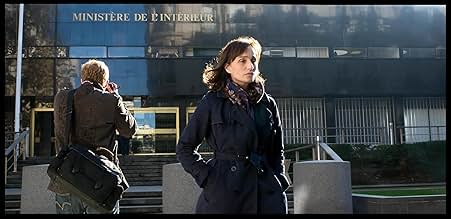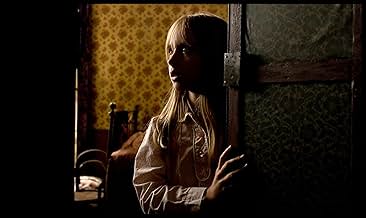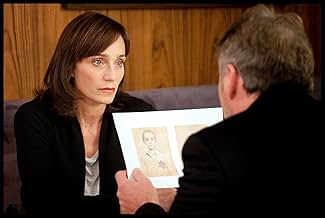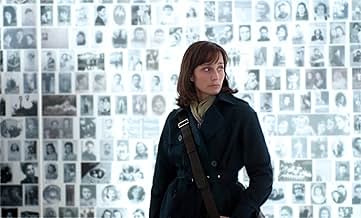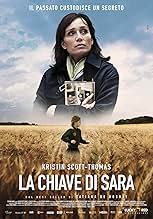CALIFICACIÓN DE IMDb
7.5/10
18 k
TU CALIFICACIÓN
Una periodista parisina ve su vida entrelazarse con la de una joven cuya familia fue destrozada por las detenciones de Vel'd'Hiv en 1942.Una periodista parisina ve su vida entrelazarse con la de una joven cuya familia fue destrozada por las detenciones de Vel'd'Hiv en 1942.Una periodista parisina ve su vida entrelazarse con la de una joven cuya familia fue destrozada por las detenciones de Vel'd'Hiv en 1942.
- Dirección
- Guionistas
- Elenco
- Premios
- 5 premios ganados y 5 nominaciones en total
Joseph Rezwin
- Joshua
- (as Joe Rezwin)
- Dirección
- Guionistas
- Todo el elenco y el equipo
- Producción, taquilla y más en IMDbPro
Opiniones destacadas
Sarah's Key (2010)
A two pronged film with a harrowing account of French anti-Semitism in World War II paralleling a contemporary account of a reporter discovering the details of one Jewish family destroyed by those events. Eventually the tales collide, and coincide, and another kind of meaning arises about accountability and acceptance.
At first this tale might strike you as both forced--the two narratives are very disjointed and separate, back and forth--and painfully familiar--another riveting, heart wrenching version of Jewish suffering and determination during the Holocaust. But stick with it, because it picks up complexity and nuance as it goes. Once you realize the roundup and mistreatment and eventual killing of the Jews is led in this case by French officials, you know this has a different kind of chill to it. And then you find that the contemporary story is literally connected to the 1940s story.
The leading actress in the 2010 thread, Kristin Scott Thomas, is one of those rare actresses who can command the screen with quiet brooding. She's convincing in a way that we identify with, and our sympathies are with her from the start. As she uncovers the facts of the past, and faces varying degrees of concern and indifference, she herself undergoes a transformation. This, by the end, is really what the story is about, the pertinence for our own times. The specific events around the title idea, the young girl's key, are horrifying to the point of being slightly sensationalist, but the rest of the movie is so studied and careful, you take it in stride.
In all I was surprised and eventually deeply moved by this movie. It's filmed with exquisite camera-work and is sharply edited. And most of all, director Gilles Paquet-Brenner gets the most from all the actors, from the children in the prison camp to the adults on all sides showing their human sides in restrained ways, without caricature.
A two pronged film with a harrowing account of French anti-Semitism in World War II paralleling a contemporary account of a reporter discovering the details of one Jewish family destroyed by those events. Eventually the tales collide, and coincide, and another kind of meaning arises about accountability and acceptance.
At first this tale might strike you as both forced--the two narratives are very disjointed and separate, back and forth--and painfully familiar--another riveting, heart wrenching version of Jewish suffering and determination during the Holocaust. But stick with it, because it picks up complexity and nuance as it goes. Once you realize the roundup and mistreatment and eventual killing of the Jews is led in this case by French officials, you know this has a different kind of chill to it. And then you find that the contemporary story is literally connected to the 1940s story.
The leading actress in the 2010 thread, Kristin Scott Thomas, is one of those rare actresses who can command the screen with quiet brooding. She's convincing in a way that we identify with, and our sympathies are with her from the start. As she uncovers the facts of the past, and faces varying degrees of concern and indifference, she herself undergoes a transformation. This, by the end, is really what the story is about, the pertinence for our own times. The specific events around the title idea, the young girl's key, are horrifying to the point of being slightly sensationalist, but the rest of the movie is so studied and careful, you take it in stride.
In all I was surprised and eventually deeply moved by this movie. It's filmed with exquisite camera-work and is sharply edited. And most of all, director Gilles Paquet-Brenner gets the most from all the actors, from the children in the prison camp to the adults on all sides showing their human sides in restrained ways, without caricature.
I was invited to this movie and had no idea of what it was about. Well it did not take long to know it was another holocaust story! I too like the way it was done with an opening into the dark past, about one week after I was born, so we're looking at almost 70 years ago, then we move back and force into last year 2009(not counting the last two days in 2011). There is a point made clear that this horror actually in this case was mainly perpetrated by French people themselves. It seems inconceivable, but the sad truth is that Jews weren't really the flavour of the era in Europe and this certainly made the task easier for the Nazis. But this story is really focused on one little girl who is caught in a two fold tragedy, perhaps one fold to prevent another. This impact the rest of the story with enormous consequences. We are to follow it through the research of a journalist who became obsessed with her finding about it. A well worth effort for all concerned. I will have to come back here for those talented and knowledgeable reviewers to learn a little more about it. But for now I have to say it was an excellent film
An American journalist in Paris embarks on a story about the Holocaust and discovers connections between the past, her present marriage and her unborn child. Beginning as an article on the 1942 roundup of Jews in France as they were sent off to Auschwitz, it soon becomes a journey of self-discovery as the protagonist stumbles upon a terrible secret of a family forced out of their home and a young girl called Sarah who makes an impulsive decision to leave her younger brother locked in a cupboard. A film about the Holocaust is certain to be moving, but the circumstances in this one are harrowing, the truth astonishing, and the coincidences as unbelievable as the tragedy itself. It is a journalist's quest to dig up the lives of others and unleash the truth, but this film show the price of these actions. Sarah's Key takes us from Paris to Brooklyn to Florence and ultimately to the centre of the heart – showing that even the truth has its cost. And the sadness, as much as we try to unlock it, can never be erased.
I must admit that I approached this movie and it's subject matter with a fair amount of trepidation given the holocaust theme once again having sat through other movies such as Sophie's Choice, The boy with the striped pajamas and The Pianist. However I must say that the story here was compelling and the performance of Kristin Scott Thomas was excellent as I have come to expect from her in other movies I have her seen her in. Perhaps as it was the French who were first and foremost the main villains in this piece the story of those black days being diluted to a degree by the switch from the past to the present was in some ways a relief from other holocaust movies. Searching for the truth concerning Sarah kept me interested until the final minutes of the film and I recommend it to those lovers of European cinema.
Films about the holocaust are always grim, but the French production Sarah's Key adds a couple of twists that increase the stress.
The story begins in Paris in the summer of 1942 when the collaborationist Vichy government of France launches a round up of Jewish families. And here is the first cruel twist. It's not German troops breaking down doors, it is the Parisian police force, ever polite in its brutality. The second twist is more harrowing. Hearing the crashing on the front door, 10-year-old Sarah Starzynski (Mélusine Mayance) stuffs her younger brother into a secret closet (camouflaged as part of the bedroom wall) and locks the door.
Sarah and her parents are herded with thousands of other Jews into the Vélodrome d'Hiver, an indoor cycling arena, and left there without food, water or toilets. Here, Sarah's overarching struggle begins. She must rescue her brother.
From here on, Sarah's story is inter-cut with episodes from the present day when French-American investigative journalist Julia Jarmond (Kristin Scott Thomas) and her architect husband start to renovate the apartment once occupied by the Starzynski family. Learning of the sad history of the "Vél d'Hiv", Julia starts digging into the apartment's history and tracing the fates of Sarah and her family.
The first two thirds of the film focus on Sarah's struggle. Separated from her parents, she seeks to escape from an internment camp and get back to Pari. As we follow her, we also watch as Julia discovers that, while both the adult Starzynskis died during the war, there is no record of what happened to Sarah and her brother.
And here is the dramatic oddity of Sarah's Key. The culmination of Sarah's quest occurs at about the 75-minute mark of this 111-minute film. The half-hour coda is necessary to tie up loose ends such as the fate of Julia's troubled marriage and the joys and disappointments of her search for Sarah. But the tension that carries the first two acts is lost.
Despite that loss, Sarah's Key packs an emotional wallop that will stay with you after you leave the theatre.
So its weak reception in the United States (it grossed just over $100,000 on just five screens when it opened there) is dispiriting. Perhaps the U.S. fear of subtitles is to blame: a good two-thirds of the film is in French with English subtitles. In fact, I suspect that writer-director Gilles Paquet-Brenner could have made the entire film in French, and that making Julia bilingual was his attempt to lure an American audience.
The story begins in Paris in the summer of 1942 when the collaborationist Vichy government of France launches a round up of Jewish families. And here is the first cruel twist. It's not German troops breaking down doors, it is the Parisian police force, ever polite in its brutality. The second twist is more harrowing. Hearing the crashing on the front door, 10-year-old Sarah Starzynski (Mélusine Mayance) stuffs her younger brother into a secret closet (camouflaged as part of the bedroom wall) and locks the door.
Sarah and her parents are herded with thousands of other Jews into the Vélodrome d'Hiver, an indoor cycling arena, and left there without food, water or toilets. Here, Sarah's overarching struggle begins. She must rescue her brother.
From here on, Sarah's story is inter-cut with episodes from the present day when French-American investigative journalist Julia Jarmond (Kristin Scott Thomas) and her architect husband start to renovate the apartment once occupied by the Starzynski family. Learning of the sad history of the "Vél d'Hiv", Julia starts digging into the apartment's history and tracing the fates of Sarah and her family.
The first two thirds of the film focus on Sarah's struggle. Separated from her parents, she seeks to escape from an internment camp and get back to Pari. As we follow her, we also watch as Julia discovers that, while both the adult Starzynskis died during the war, there is no record of what happened to Sarah and her brother.
And here is the dramatic oddity of Sarah's Key. The culmination of Sarah's quest occurs at about the 75-minute mark of this 111-minute film. The half-hour coda is necessary to tie up loose ends such as the fate of Julia's troubled marriage and the joys and disappointments of her search for Sarah. But the tension that carries the first two acts is lost.
Despite that loss, Sarah's Key packs an emotional wallop that will stay with you after you leave the theatre.
So its weak reception in the United States (it grossed just over $100,000 on just five screens when it opened there) is dispiriting. Perhaps the U.S. fear of subtitles is to blame: a good two-thirds of the film is in French with English subtitles. In fact, I suspect that writer-director Gilles Paquet-Brenner could have made the entire film in French, and that making Julia bilingual was his attempt to lure an American audience.
¿Sabías que…?
- TriviaThis was the most successful French movie in the Netherlands, due to the popularity of the book on which this movie was based, until Amigos (2011) took the record.
- Errores(at around 1h 34 min) William finds the key to the closet in his mom's diary. But when Sarah opened the closet back in 1942, she left the key in the lock and was immediately taken away by her stepfather. So there is no way that she would still have the key.
- Citas
Julia Jarmond: And so I write this for you, My Sarah. With the hope that one day, when you're old enough, this story that lives with me, will live with you as well. When a story is told, it is not forgotten. It becomes something else, a memory of who we were; the hope of what we can become.
- Versiones alternativasThe UK Blu-ray release has approx 9 minutes cut from the film compared to the French version.
- ConexionesFeatured in De wereld draait door: Episode #6.38 (2010)
- Bandas sonorasLa Java Bleue
Music by Vincent Scotto
Lyrics by Georges Koger and Noël Renard
Licensed courtesy of EMI Records Ltd
All rights reserved
Selecciones populares
Inicia sesión para calificar y agrega a la lista de videos para obtener recomendaciones personalizadas
- How long is Sarah's Key?Con tecnología de Alexa
Detalles
- Fecha de lanzamiento
- País de origen
- Idiomas
- También se conoce como
- Sarah's Key
- Locaciones de filmación
- Rue Nélaton, París, Francia(Julia at the Vel d'Hiv historical location)
- Productoras
- Ver más créditos de la compañía en IMDbPro
Taquilla
- Presupuesto
- EUR 10,000,000 (estimado)
- Total en EE. UU. y Canadá
- USD 7,693,187
- Fin de semana de estreno en EE. UU. y Canadá
- USD 115,708
- 24 jul 2011
- Total a nivel mundial
- USD 24,792,815
- Tiempo de ejecución1 hora 51 minutos
- Color
- Mezcla de sonido
- Relación de aspecto
- 2.35 : 1
Contribuir a esta página
Sugiere una edición o agrega el contenido que falta

Principales brechas de datos
By what name was La llave de Sarah (2010) officially released in India in English?
Responda





